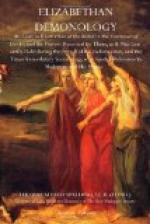18. (ii.) The second principle is that of the Manichaeists: the division of spirits into hostile camps, good and evil. This is a much more common belief than the orthodox are willing to allow. There is hardly any religious system that does not recognize a first source of evil, as well as a first source of good. But the spirit of evil occupies a position of varying importance: in some systems he maintains himself as co-equal of the spirit of good; in others he sinks to a lower stage, remaining very powerful to do harm, but nevertheless under the control, in matters of the highest importance, of the more beneficent Being. In each of these cases, the first principle is found operating, ever augmenting the ranks; monodiabolism being as impossible as monotheism; and hence the importance of fully establishing that proposition.
19. (iii.) The last and most important of these principles is the tendency of all theological systems to absorb into themselves the deities extraneous to themselves, not as gods, but as inferior, or even evil, spirits. The actual existence of the foreign deity is not for a moment disputed, the presumption in favour of innumerable spiritual agencies being far too strong to allow the possibility of such a doubt; but just as the alien is looked upon as an inferior being, created chiefly for the use and benefit of the chosen people—and what nation is not, if its opinion of itself may be relied upon, a chosen people?—so the god the alien worships is a spirit of inferior power and capacity, and can be recognized solely as occupying a position subordinate to that of the gods of the land.
This principle has such an important influence in the elaboration of the belief in demons, that it is worth while to illustrate the generality of its application.
20. In the Greek system of theology we find in the first place a number of deities of varying importance and power, whose special functions are defined with some distinctness; and then, below these, an innumerable band of spirits, the souls of the departed—probably the relics of an earlier pure ancestor-worship—who still interest themselves in the inhabitants of this world. These [Greek: daimones] were certainly accredited with supernatural power, and were not of necessity either good or evil in their influence or action. It was to this second class that foreign deities were assimilated. They found it impossible, however, to retain even this humble position. The ceremonies of their worship, and the language in which those ceremonies were performed, were strange to the inhabitants of the land in which the acclimatization was attempted; and the incomprehensible is first suspected, then loathed. It is not surprising, then, that the new-comers soon fell into the ranks of purely evil spirits, and that those who persisted in exercising their rites were stigmatized as devil-worshippers, or magicians.




